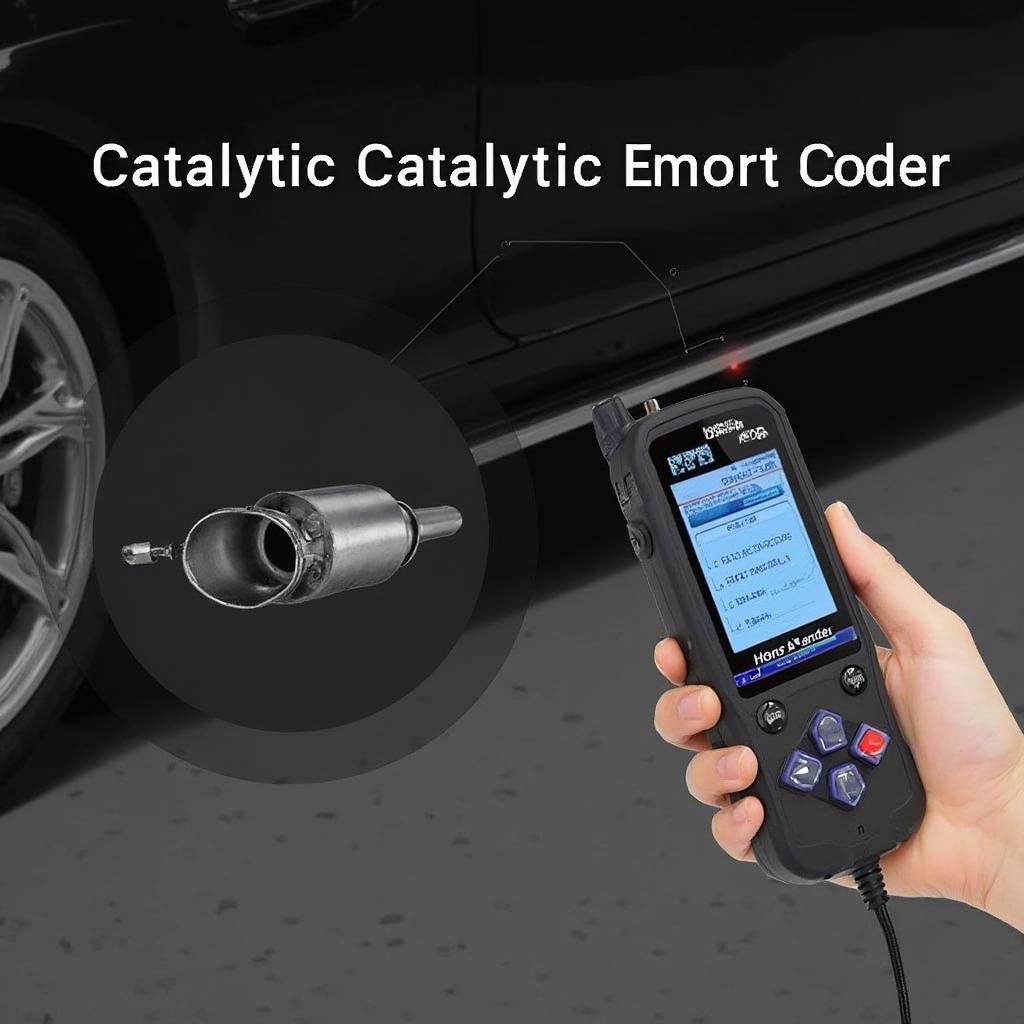The OBD2 catalytic converter function is crucial for maintaining a healthy environment and ensuring your vehicle runs efficiently. This article delves into the intricacies of the catalytic converter, its role in emissions control, and how OBD2 scanners help diagnose related issues. We’ll explore everything from the basic science behind catalytic converters to advanced diagnostics, empowering you to understand and address potential problems.
The catalytic converter is an essential component of your vehicle’s exhaust system, responsible for converting harmful pollutants into less harmful substances. This process significantly reduces the environmental impact of your car. However, like any other part, catalytic converters can malfunction, leading to decreased performance and increased emissions. That’s where your OBD2 scanner comes in. obd2 info disolaybfor 1997 dodge
How Does an OBD2 Scanner Detect Catalytic Converter Problems?
OBD2 scanners monitor various sensors in your exhaust system, including oxygen sensors located before and after the catalytic converter. By comparing the readings from these sensors, the scanner can determine the efficiency of the converter. A failing converter will show a minimal difference in oxygen levels between the two sensors.
 OBD2 Scanner Diagnosing Catalytic Converter Issues
OBD2 Scanner Diagnosing Catalytic Converter Issues
Common OBD2 Codes Related to Catalytic Converter Function
Several OBD2 codes specifically indicate problems with the catalytic converter. These codes provide valuable clues for diagnosing the issue. Some common codes include P0420 (Catalyst System Efficiency Below Threshold (Bank 1)) and P0430 (Catalyst System Efficiency Below Threshold (Bank 2)).
Diagnosing OBD2 Catalytic Converter Issues
Diagnosing catalytic converter problems often involves more than just reading OBD2 codes. A thorough diagnosis should include a visual inspection of the converter for physical damage, checking for exhaust leaks, and monitoring the engine’s performance for symptoms like reduced power or poor fuel economy. obd2 drive cycle on lift
What Causes Catalytic Converter Failure?
Several factors can contribute to catalytic converter failure. Common causes include:
- Engine Misfires: Unburnt fuel entering the converter can overheat and damage the catalyst.
- Faulty Oxygen Sensors: Incorrect readings from oxygen sensors can disrupt the fuel-air mixture, impacting converter performance.
- Leaded Fuel: Using leaded fuel in a vehicle designed for unleaded fuel can poison the catalyst.
- Physical Damage: Impacts or debris can damage the converter’s internal structure.
“Regular maintenance and addressing engine issues promptly can significantly extend the life of your catalytic converter,” advises John Smith, Senior Automotive Engineer at Acme Auto Solutions.
Preventing Catalytic Converter Problems
Regular maintenance is key to preventing catalytic converter issues. This includes addressing engine problems promptly, using the correct fuel type, and avoiding driving over rough terrain that could damage the converter. ford obd2 apps
Why is Regular Maintenance Important?
Regular maintenance can prevent minor issues from escalating into major problems, saving you time and money in the long run. It also helps ensure your vehicle operates at peak efficiency and minimizes its environmental impact.
“Early diagnosis is crucial. Addressing issues like misfires or faulty oxygen sensors can prevent costly catalytic converter replacements,” explains Jane Doe, Certified OBD2 Technician at Diagnostic Solutions Inc.
Conclusion
Understanding the OBD2 catalytic converter function is essential for maintaining a healthy vehicle and a healthy environment. By utilizing an OBD2 scanner, performing regular maintenance, and addressing potential issues promptly, you can ensure your catalytic converter functions optimally and minimizes your vehicle’s environmental footprint. Remember, a well-maintained catalytic converter is crucial for reducing harmful emissions and complying with environmental regulations. obd2 code p2195
FAQ
- What is the function of a catalytic converter?
- How does an OBD2 scanner detect catalytic converter problems?
- What are common OBD2 codes related to catalytic converter function?
- What causes catalytic converter failure?
- How can I prevent catalytic converter problems?
- What are the symptoms of a failing catalytic converter?
- How much does it cost to replace a catalytic converter?
You can also find more helpful information about OBD2 codes and troubleshooting on our website. Check out our articles about obd2 ford explorer white yellow.
Need further assistance? Contact us via WhatsApp: +1(641)206-8880, Email: [email protected] or visit us at 789 Elm Street, San Francisco, CA 94102, USA. We have a 24/7 customer support team ready to help.

